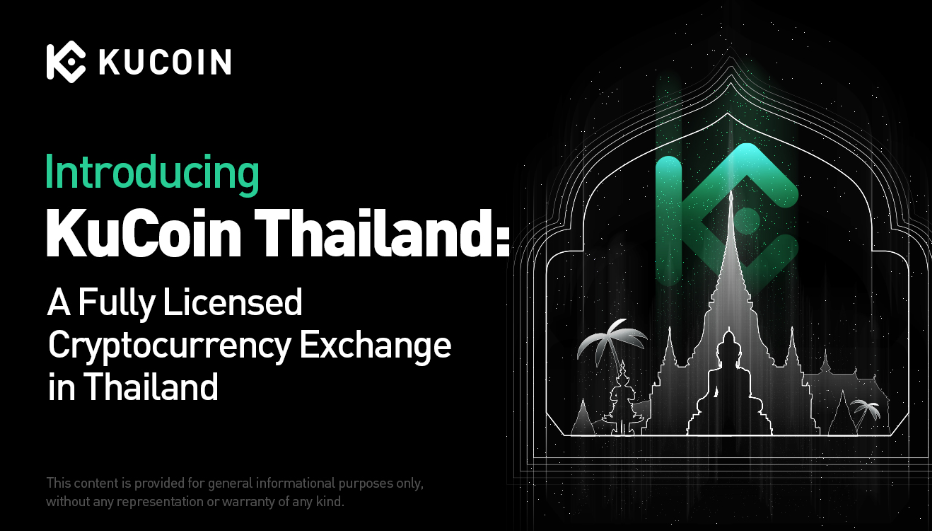KuCoin officially entered the Thai crypto exchange market on April 22 by launching a regulated trading platform under the name KuCoin Thailand.
The move came after ERX Company Ltd, which was already licensed by the Thailand Securities and Exchange Commission (SEC), rebranded to operate under the KuCoin name.
The announcement was made public on April 23.

The exchange now operates under a full Thai SEC license, which allows it to offer regulated digital asset trading to Thai users.
ERX users have already been migrated to the new KuCoin Thailand system. The newly launched KuCoin TH app is available on Android and iOS platforms and supports localized features required by Thai law.
Chief executive Att Tongyai Asavanund said the company aims to meet local regulatory standards while adapting its services for Thai users. He stated,
“We’re strengthening our ability to offer localized solutions tailored to the Thai market.”
The exchange emphasized its commitment to aligning with all national compliance requirements, including customer verification and anti-money laundering measures.
Thailand Crypto Exchange Sector Already Faces Heavy Competition
The Thai crypto market is already tightly packed with licensed digital asset exchanges. KuCoin Thailand enters a sector where multiple licensed firms operate under oversight from the Thai SEC.
These companies are well established, and some already hold a large share of local trading volumes.
Bitkub Online currently leads the market, with a daily trading volume of around $70 million, according to data from CoinGecko.
KuCoin’s global platform, by contrast, reports around $3.8 billion in daily volume. However, the numbers do not reflect KuCoin’s current influence in Thailand, where it begins with zero direct market share under its new brand.
To succeed, KuCoin Thailand must navigate a well-regulated landscape that demands strict compliance.
The exchange plans to offer all core crypto trading services under the structure allowed by its Thai SEC license.
Market observers will watch whether KuCoin Thailand can capture user interest in a market already serviced by several major exchanges.
Thai SEC License Allows Trading, But Payment Use Remains Banned
Although KuCoin Thailand now holds a valid Thai SEC license to operate, its users remain subject to the country’s broader legal restrictions.
In 2022, the Bank of Thailand issued a ruling that banned the use of cryptocurrencies for payments. This restriction still applies, limiting digital assets strictly to trading and investment.
Crypto remains widely used in Thailand for trading and speculation, especially among younger investors. However, regulatory pressure has increased.
In April 2025, Thai finance authorities began targeting foreign crypto platforms that operate without registration.
This enforcement effort focused on peer-to-peer platforms suspected of facilitating scams or bypassing local compliance.
Despite the popularity of crypto assets, the government has been cautious about expanding their legal uses.
In January 2025, it introduced a pilot program on Phuket island, where tourists would be allowed to use Bitcoin in a controlled environment. The program has not yet launched, and authorities have not issued an updated timeline.
KuCoin Faces Legal Pressure in U.S. During Global Expansion
While KuCoin Thailand begins trading under proper licensing, the broader KuCoin brand is facing legal scrutiny in the United States.
In March 2024, the Commodity Futures Trading Commission (CFTC) filed a case against KuCoin, alleging violations of the Commodity Exchange Act. The case is still open, with KuCoin reportedly working on a settlement.
According to the complaint, KuCoin allowed U.S. users to access crypto derivatives without registering with the CFTC.
The case highlights the legal risks facing global crypto platforms that serve regulated markets without licenses. As of now, there are no new developments in the U.S. proceedings.
Despite the pending legal process, KuCoin has expanded its operations in countries with clear crypto laws, such as Thailand.
By working with ERX Company Ltd, KuCoin Thailand avoids the issues tied to unlicensed operations.
The exchange is positioning itself to serve the regulated Thailand crypto exchange sector while addressing legal matters in the U.S. separately.
Disclosure:This article does not contain investment advice or recommendations. Every investment and trading move involves risk, and readers should conduct their own research when making a decision.
Kriptoworld.com accepts no liability for any errors in the articles or for any financial loss resulting from incorrect information.


